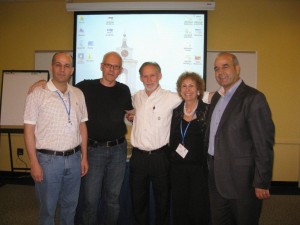
From left: Dr. Mohammad Bader, Dr. Eugene Jaffe, Dr. Robert E. McNulty, Dr. Liora Katzenstein, and Dr. Samir Abuznaid
All four professors were firmly united in their desire and commitment to achieving a just and sustainable peace based on a two-state solution. There are many complicating issues that serve as obstacles to achieving this shared objective, however — given the reported unofficial boycott by Palestinians scholars to participation in this kind of encounter with their Israeli counterparts since the conflict in Gaza that began in December 2008 — one participating scholars referred to the one week meeting as a “breakthrough.â€
These four professors came to Waltham, MA on May 16th, 2010 to join in a one-week program called the “Global Business Ethics Symposium†and the “Global Business Ethics Teaching Workshop,†sponsored by the State Street Foundation and organized by the Bentley Alliance for Ethics and Social Responsibility. This outreach to Israeli and Palestinian scholars was part of the informal Business for Peace Initiative I have led in my capacity as the director of programs at Bentley University’s Center for Business Ethics and is consistent with my Pax Populi work with Applied Ethics, Inc. The names and institutional affiliations of these visiting scholars are:
Prof. Samir Ahmad Abuznaid is the Deputy Governor of Hebron and Vice President of Academic Affairs for Hebron University, Palestinian territories
Prof. Eugene D. Jaffe heads the MBA Programs at the School of Social Sciences and Management, Ruppin Academic Center and is Emeritus Professor at the Graduate School of Business Administration, Bar-Ilan University, both in Israel.
Prof. Liora Katzenstein
President ISEMI – Entrepreneurship College, Israel
Mohammed Bader
Assistant Professor and Head of the Department of Banking and Finance, Al-Quds University, Jerusalem
The program began on Monday, May 17th, 2010 by a panel discussion that I moderated in which all four responded to the topic, “The Role of Business in Seeking a Sustainable Future for the Israeli and Palestinian Peoples.†After that, the four professors participated along with a group of other professors from around the United States and several other countries in the four-day “Faculty Global Business Ethics Teaching Workshop.†(See http://alliance.bentley.edu/symposium and http://www.bentley.edu/alliance/Global_Business_Ethics_Teaching_Workshop.cfm.) During this time, the Palestinian and Israeli professors also engaged in informal but frank and intensive conversations pertaining to their respective concerns regarding the prospects and obstacles to normalized relations and their shared desire for arriving at a two-state solution, with the nations of Israel and Palestine living side by side as independent states with close economic, social, and cultural ties. It was not long ago that this view would have been seen as impossible, but the situation has changed rather dramatically and polling data show that a large majority of people in both communities see a peaceful two-state solution as their best option.
Although it may have been a small “breakthrough,†still it was seen as significant by the entire group; before our time together came to an end, we agreed to try to stay in touch and continue efforts to advance peace between these two peoples. The stakes are high and significant for the entire world. There are many significant impediments to a settlement, most notably, final borders, the right of return of Palestinian refugees, and the status of Jerusalem. Moreover, it was argued that the settlement of the Israeli-Palestinian conflict will also require coming to a settlement in the disputes between Israel, Lebanon and Syria. As difficult as it may be to arrive at a solution to these and related problems, both sides were in agreement that no efforts should be spared in reaching a just and lasting settlement.
An article that appeared in a local paper, the Salem News, on this Palestinian-Israeli Outreach can be found at: http://www.salemnews.com/local/x1414109397/Palestinian-and-Israeli-professors-talk-ethics
1 Comment
Robert E. McNulty · June 10, 2014 at 6:06 am
Thank you. None of the writings on our website are paid for. They were all created to support the peacebuilding mission of Pax Populi. All our posts are written by the identified authors, mostly by leaders at Pax Populi, while many other pieces were written as part of a series we call “Voices from the New Afghanistan.” We are not a large organization, but we are dedicated to finding ways forward that avoid war and violence through education, economic development, and human rights. Our focus is especially on Afghanistan, but our work applies equally to all places where we can support those struggling in conflict zones, be they affected by the conflicts between the Israelis and Palestinians, India and Pakistan, or tribal/religions conflicts in Africa, and elsewhere. Spread the word. Until peace prevails and war is discarded as a vestige of a pre-civilized period in human history, Pax Populi need dedicated peacebuilders to help advance the mission that the time for war has passed and that better ways are available to resolve conflict.